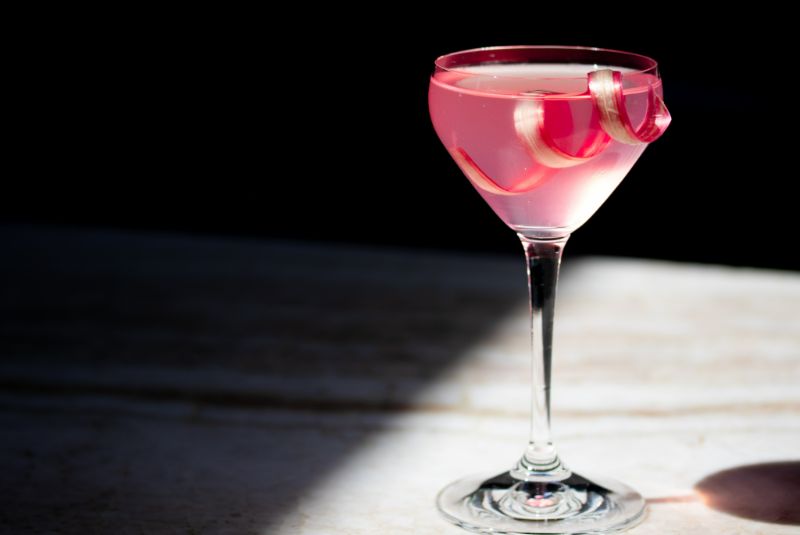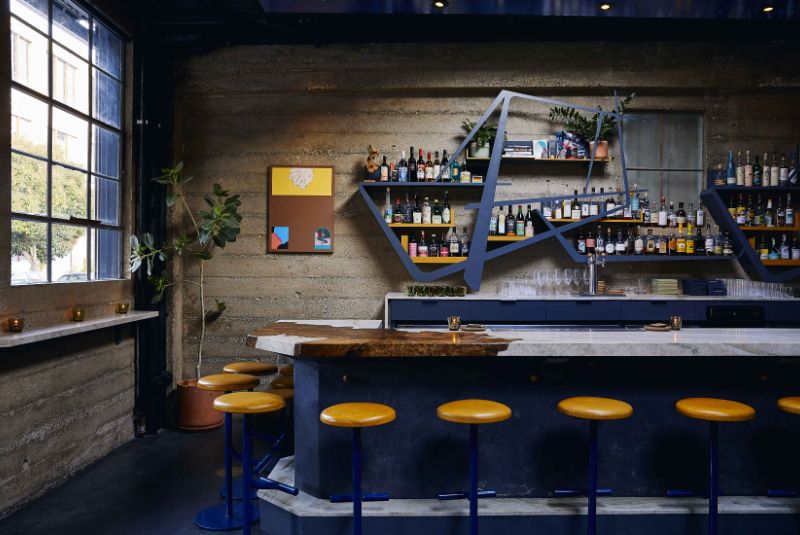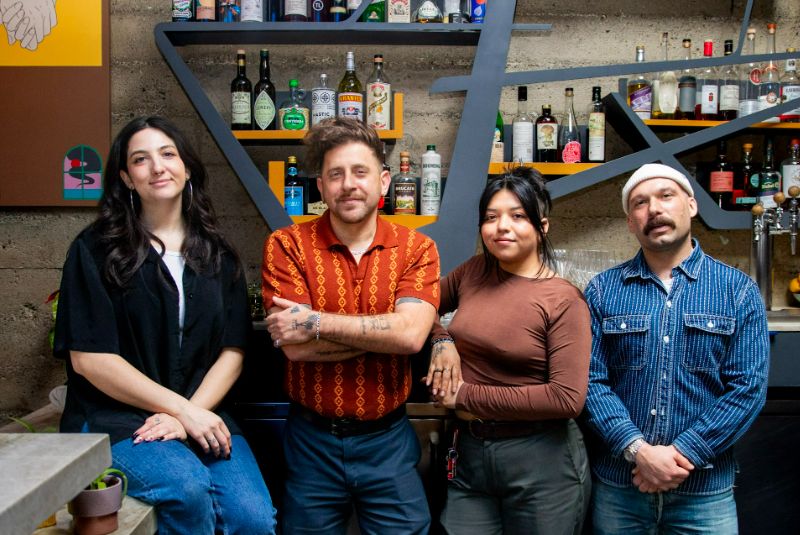By putting community, the environment and employees first, this San Fran bar has gone from local legend to North America’s leading light in sustainable cocktail serves. True Laurel’s director, Nicolas Torres, tells 50 Best why he thinks the bar won the Ketel One Sustainable Bar Award at North America’s 50 Best Bars 2024
After the success of their much-lauded cocktail-focused restaurant, Lazy Bear, chef David Barzelay and bar director Nicolas Torres’ sophomore effort dives deeper into the terroir of San Francisco’s Bay Area, delivering drinks imbued with flavour profiles that can’t be found anywhere else. It’s this hyper-local philosophy that has given the bar its name: True Laurel. Also known as the California Bay laurel, it’s native to the west coast and the only tree of the Lauraceae family found in the western United States.
Beyond the glass, Torres has crafted a space where caring for guests’ and employees’ welfare is paramount. When it comes to sustainability, it’s not just about how the industrial art-chic bar, found in San Fran’s Mission District, ethically uses ingredients, it’s also about how the establishment achieves longevity through its commitment to the future through its community.
“Because part of sustainability is us,” explains Torres. “It’s our wellbeing and how to get by and how we please our guests and how we pay our staff.”
From Bay to bar
True Laurel uses local Bay Area produce wherever possible within its menu
Torres has woven his extensive non-profit background in environmental education, environmental justice and native habitat restoration into his vision for True Laurel. “My experiences were a heavy influence on the bar. By observing our natural surroundings, I learned about the history of the land and how local crops were used. I firmly believe that the most local you can get is by learning what is growing around you and how to use it,” says Torres. Now in their sixth year of operation, True Laurel continues to focus on the locality of Northern California, lessening its carbon footprint in the process by utilising ‘ugly fruit’ (fruit unfit to sell) from Bay Area and Central Valley farmers.
Local flora also plays into its drinks in beautifully creative ways. Take the Sunny Side of the Street, a twist on the boulevardier that features native sunchokes, also known as Jerusalem artichokes. Torres starts by roasting sunchokes from the local farmers’ market and infusing them into French apple brandy, then adding sweet vermouth and spiced pear liqueur. The drink is finished with an acidic edge using yellow wood sorrel, a species that’s considered invasive.
“Yellow wood sorrel is chock full of oxalic acid and has very cool green notes,” says Torres. “We're experimenting with different types of acidifiers in the bar community now because shipping citrus around the world is crazy and really expensive. With wood sorrel, I’ve found a cool acidifier that grows everywhere and will never run out.”
Growing a community
The venue's kitchen works in synergy with the bar to create a low-waste food and drink programme
The food menu, composed of sharable small plates, is as accessible as it is interesting. Crispy hen of the woods mushrooms are dipped in a sumptuous sour cream and alliums dip while a twice-baked potato is slathered in red miso butter, green onions, chili-spiked crème fraiche and cheddar and finished off with some flaky katsuobushi.
When there are ingredients that can be used in multiple ways, the kitchen and bar work together to make sure they go as far as possible. “Where we know we are leaving a footprint, we ask: how do we offset this?” explains Torres. One answer is by creating ferments from scraps. A ceviche that chef Barzelay devised for the food menu uses pineapple juice squeezed from imported fruit, so Torres stepped in to find a way to eke out the leftovers.
“I told David not to throw away the skins as I knew I could use them,” explains Torres. The bar team already had local California guavas that were going soft, so Torres threw them in with the pineapple skins and let their natural yeasts work their magic to create a tepache (a fermented drink made from pineapple skins). He then topped it up with tequila blanco infused with rice paddy herbs. These lemony plants with cumin-like undertones were first brought to the area by Vietnamese refugees and, in this case, are sourced from Ken Phan, who grows them in the nearby Sacramento Delta. The cocktail, entitled Paddy Issues, is the drink Torres is most excited about on the current menu.
Naturally, partnerships with other like-minded businesses are also inextricably linked with its sourcing practices. Another ferment used in the bar – this time a naturally fermented cider from Bardos, in nearby Sonoma – comes from fruit sourced from forgotten, dry-farmed orchards.
The bar’s profits have also been donated to organisations such as the Two Eighty Project, which works to increase diversity and equality in the wine industry and Sogorea Te’ Land Trust, an Indigenous and women-led organisation dedicated to cultural revitalisation and rematriation of the land.
Putting people first
Bar director Nicolas Torres (centre-left) ensures his staff maintain a healthy work-life balance
True Laurel’s success wouldn’t have been possible without Torres’ dedication to fostering a supportive environment for the whole team. Though 40 hours is the normal requirement for a full-time work week, employer-tied health benefits at the bar kick in for True Laurel’s staff at 30 hours. Team members who started as bar backs have consistently worked their way towards becoming bartenders through dedicated training and support.
There’s also a concerted effort to give staff the schedules they want, while also providing days off around the winter holiday by closing the bar’s doors. Feedback is always encouraged and the dress code, save for an apron, is lax so that everyone can work as they feel most comfortable. Staff are also encouraged to go on bar-funded distillery visits and the bar pays to send bartenders around the world on guest shifts.
While the bar’s all-encompassing sustainability ethos is larger than the sum of its parts, there are little elements that stand out, too. Seemingly small initiatives, like using the whole ingredient from the pith to the flesh and skin of the fruit and everything from the seeds to the flowers of the plant to make tinctures or tonics, make a significant difference.
The team also employs a Gastrovacs – a sous vide machine that eliminates the bar’s need for single use plastic – which has helped True Laurel earn the certification of being deemed an ocean-friendly business by the Surfrider Foundation. It can now add the Ketel One Sustainable Bar Award to its roster of accolades.
Miss the ceremony? Watch the highlights here:
The list of North America’s 50 Best Bars 2024, sponsored by Perrier, was revealed at a live awards ceremony at Rosewood San Miguel de Allende, Mexico, on Tuesday 23rd April 2024. Follow us on Facebook, Instagram, X and YouTube to stay up to date with all the news and announcements

